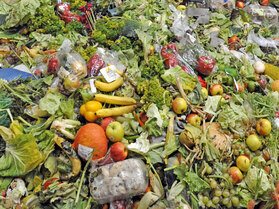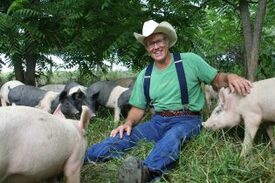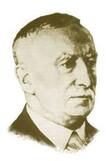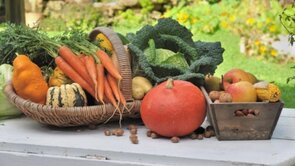If we don't do something about it human greed will drive our civilisation to extinction
|
Without doubt there will be very worrying days ahead for most countries in the West this winter but there are ways in which many of us can help to alleviate some of the challenges. There are two major problems. First and foremost is food waste. There are over 7 billion people on this planet, of which 925 million are starving. A recent report claims that of the roughly one third of the food produced in the world for human consumption 1.3 billion tons is lost and wasted annually or enough to feed 3 billion people. These figures do not reflect the fact that large amounts of land, energy, fertilizers and water have also been lost in the production of foodstuffs which simply end up as waste. This level of wastage is a tragedy that cannot continue if we are to succeed in the challenge of sustainably meeting our future food demands.

SHAMEFUL WASTE OF GOOD FOOD
Each one of us could help to reduce food waste by making sure that perfectly good food does not get thrown away. Major supermarkets, in meeting consumer expectations, will often reject entire crops of perfectly edible fruit and vegetables at the farm because they do not meet exacting marketing standards for their physical characteristics, such as size and appearance. In the UK alone, up to 30% of the vegetable crop is never harvested as a result of such practices. Globally, retailers generate 1.6 million tonnes of food waste annually in this way. However, recently some supermarkets have begun to offer slightly imperfect fruit, such as apples at a knock down price which is a very encouraging sign. The introduction of sell by dates has been a major contributor to food waste as people often discard food unnecessarily once the date has passed. Previous generations would rely on the look and smell of food to know whether it was still fresh enough to eat. Supermarkets often offer three items for the price of two which also contributes to waste. This practice should be banned as people are tempted to buy more than they really need and the surplus is wasted. SHORTAGE OF FERTILIZERS Due to the war in the Ukraine farmers and growers have been warned that fertilizers will be in very short supply as the large quantities that have previously been imported from Russia and the Ukraine may no longer be available. Food shortages will inevitably be the result. The sowing of winter crops may already have been disrupted and certainly next year’s spring crops will be put in jeopardy. This is the second major problem that has to be addressed and where organic farming comes into its own. Food produced organically does not use any artificial fertilizer and relies totally on natural compost. 
ORGANIC FARMING IS THE WAY FORWARD
American farmer Joel Salatin of Polyface Farm in the Shenandoah Valley, Virginia, illustrates how successful organic farming can be. He uses the simple practice of rotational grazing understood by generations of farmers before the industrial era. Every year, on just one hundred acres of pasture, Polyface Farm produces about twenty tons of beef, fifteen tons of pork, ten thousand chickens, twelve hundred turkeys, a thousand rabbits and more than four hundred thousand eggs. All produced entirely without the use of pesticides or chemical fertilizers. The animals are reared out in the fields and all waste is recycled naturally with the result that year on year the pastures become ever more fertile as essential minerals and trace minerals are returned to the land. This system provides a secure food supply in a truly sustainable way. There need to be many more farms such as Salatin’s in other countries. Watch this short documentary (28 minutes) and interview with Joel Salatin With government backing to help young farmers get started it would all be possible. Even in a small way those with gardens could cultivate organic food for their own consumption using composted kitchen waste. |
DEFORESTATION, MINERAL LOSS AND CLIMATE CHANGE
The Amazon forest, said to act as the lungs of the world has been and still is being devastated at an alarming rate. Illegal logging has been allowed to continue over decades which is undoubtedly contributing to climate change worldwide thereby causing loss of crops essential to feed the ever increasing human population.  Sir Albert Howard Sir Albert Howard
Climate change is in fact nothing new. In his book Farming and Gardening for Health or Disease, written in the 1940’s, Sir Albert Howard points out that the countries bordering the Mediterranean used to be well wooded but due to the slow and continuous deforestation over the last 3,000 years no forests are to be found in the Mediterranean region proper. Most of the original soil and valuable minerals have been washed away by the sudden winter torrents. In North Africa the fertile cornfields that existed in Roman times are now desert. In Egypt, when its extensive forests were devastated the climate became arid and suffocating; water from springs first decreased and then disappeared leaving desert in its place. This decrease in rainfall and soil fertility was accompanied by loss of uniformity in the climate. Palestine was once covered with valuable forests and fertile pastures. It possessed a cool and moderate climate but now its mountains are denuded, its rivers are almost dry and crop production has been severely affected.
MINERAL LOSS Sir Albert warned of impending disaster after farmers abandoned the old and well tried principles of mixed farming in favour of artificial manures. Until the mid-20th century, farmers maintained phosphorus levels in the soil by composting plant waste or spreading phosphorus-rich manure. Sir Albert wrote 'This slow poisoning of the life of the soil by artificial manures is one of the greatest calamities which has befallen agriculture and mankind...' He pointed to 'the steady growth of disease in crops, animals and mankind. The spraying machine was called in to protect the plant; vaccines and serums the animal…The population, fed on improperly grown food, has to be bolstered up by an expensive system of patent medicines, panel doctors, dispensaries, hospitals and convalescent homes. " WELCOME TO A HEALTHIER SUSTAINABLE FUTURE Sir Albert stressed that the importance of the connection between a fertile soil and healthy crops, healthy animals and healthy human beings must be made more widely known. He observed also that animals fed on grain from fertile soil needed about 15% less and still thrived as well as having a greater resistance to disease. He urged communities with sufficient land of their own, to feed themselves by producing their own vegetables, fruit, milk and milk products, cereals and meat, thereby demonstrating the beneficial results of fresh food raised on fertile soil. An excellent example of this is the community in the village of Martin in Hampshire. It is one of the first in England to defy the power of the supermarkets by achieving communal self-sufficiency in food. Under the name of Futurefarms, it produces 45 types of vegetables in just two fields in the village. Within the fields, two acres are set aside for rearing free-range pigs while chicken runs are moved regularly across the bigger field and the rest of the land is grazed by sheep.
Let's hope that this small beginning will inspire others and lead to a healthier more sustainable future. |

